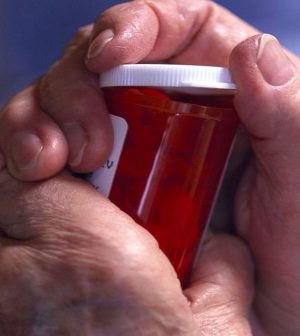- Recognizing the Signs of Hypothyroidism
- 10 Strategies to Overcome Insomnia
- Could Artificial Sweeteners Be Aging the Brain Faster?
- Techniques for Soothing Your Nervous System
- Does the Water in Your House Smell Funny? Here’s Why
- Can a Daily Dose of Apple Cider Vinegar Actually Aid Weight Loss?
- 6 Health Beverages That Can Actually Spike Your Blood Sugar
- Treatment Options for Social Anxiety Disorder
- Understanding the Connection Between Anxiety and Depression
- How Daily Prunes Can Influence Cholesterol and Inflammation
Is Medicare Overspending? Costco Prices Much Less for Generic Drugs

Can Costco beat Medicare Part D when it comes to prescription drug prices?
Apparently so, claims a new study that found that roughly half of generic medications were cheaper when purchased from the discount retailer than from the government program.
The researchers compared the prices paid by Medicare Part D plans (including patient out-of-pocket payments) for 184 generic prescription drugs to the cash prices paid by Costco members for the same prescriptions in 2017 and 2018. More than 45 million Americans are enrolled in Medicare Part D, which provides coverage for outpatient prescriptions.
Compared to Costco member prices, Medicare plans overspent by 13% in 2017 and almost 21% in 2018, the findings showed. Medicare plan participants paid more than Costco members on nearly 53% of 90-day fills in 2018. On all 30- and 90-day prescription fills, Medicare plans overpaid 43% of the time, the University of Southern California (USC) researchers found.
“Our analysis shows that in systems like Costco’s, where incentives are set up to deliver value directly to the consumer at the pharmacy counter, that’s what happens,” said study author Erin Trish. She is associate director of the USC Schaeffer Center and an assistant professor of pharmaceutical and health economics at USC’s School of Pharmacy.
“It’s time to fix those incentives in the Medicare Part D system to put the patient first,” Trish said in a USC news release.
Her team published its findings online July 6 as a research letter in JAMA Internal Medicine.
Pharmacy benefit managers and other intermediaries negotiate drug prices on behalf of Medicare, but they don’t appear to be passing all of the savings from the negotiated prices to the plans and the patients, according to the researchers.
Generic drugs account for 22% of Part D spending, so policymakers should take a closer look at the practices of these intermediaries, the team suggested.
Study author Geoffrey Joyce is director of health policy at the Schaeffer Center and chair of the department of pharmaceutical and health economics at the USC School of Pharmacy. He said, “Efforts to reduce prescription drug prices tend to focus on brand-name medicines, but the opaque pharmaceutical supply system can also cause health plans and taxpayers to overpay for generics.”
And Karen Van Nuys, executive director of the Schaeffer Center’s Value of Life Sciences Innovation Program and assistant professor at USC’s School of Public Policy, added, “There is lots of price competition among manufacturers for these drugs, but that competition isn’t benefiting the consumer. These are not small-market drugs where there might be only one supplier who can name their price.”
More information
Medicare.gov has more on Medicare Part D.
SOURCE: University of Southern California, news release, July 6, 2021
Source: HealthDay
Copyright © 2026 HealthDay. All rights reserved.










